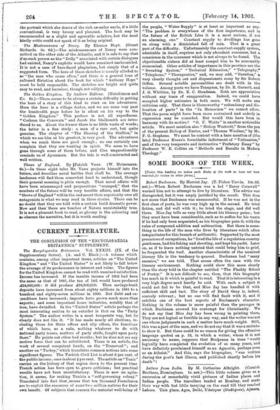CURRENT LITERATURE.
THE CONCLUSION OF THE " ENCYCLOPAEDIA BRITANNICA" SUPPLEMENT.
The Encyclopaedia Britannica. Vol %XXIII. (IX. of the Supplementary Series). (A. and C. Black.)—A volume which contains, among other important items, articles on "The United Kingdom" and "The United States" is not likely to fall below the average of its predecessors in interest and value. The figures for the United Kingdom cannot be read with unmixed satisfaction. Licome has increased. If the taxable income of 1902 had been the same as that of 1881, the tax of 14d. would have produced X24,850,000: it did produce £34,800,000. Then savings-bank deposits have increased from about eighty millions in 1881 to a hundred and eighty-seven millions in 1900. But Debt and ex- aenditure have increased; imports have grown much more than exports ; and some important home ' industries, notably that of iron, have dwindled. In the "United States" article perhaps the most interesting section to an outsider is that on the "Party System." The author, writes in a most temperate way, but he clearly does not like it. "It has made nearly all elections, in- cluding those for State offices and city offices, the functions of which have, as a rule, nothing whatever to do with national party issues, matters of party strife, fought upon party li.tes." He' points out other bad results ; but he does not see any motive force that can be substituted. There is an article, the work of several competent hands, on the " Transvaal "; and another on "Turkey," which translates common notions into some significant figures. The Turkish Civil List is about 6 per cent. of the public income; ours is about percent. The article on "Tunis" carries on the history of that region down to the present time French action has been open to grave criticism; but practical results have not been unsatisfactory. There is now an agita- tion, it seems, for making Tunisia a "self-governing colony." Translated into fact that .means that ten thousand Frenchmen are to exploit the resources of some'two million natives for their own benefit. - Of subjects that concern the material well-being of the people, "Water Supply" is at least as important as any. "The problem is everywhere of the first importance, and in the future of the British Isles it is a most serious, if not an alarming, one." Constant supply to dwellings has gone on along with a diminished fall of rain. That is a great part of the difficulty. Unfortunately the constant-supply system, admirable in itself, requires not only abundant resources, but a conscience in the consumer which is not always to be found. The objectionable cistern did at least compel him to be reasonably economical. Other articles of importance in this province are the "Sweating System," "Technical Education," "Telegraphy," "Telephone," "Therapeutics," and, we may add, "Taxation," a very clearly thought out and dispassionate essay by Sir Robert Giffen. Several notable personalities are dealt with in the volume. Among poets we have Tennyson, by Dr. R. Garnett, and J. G. Whittier, by Dr. E. C. Steadman. Both are appreciative without any trace of exaggeration. Indeed, we could have accepted higher estimates in both cases. We will make one criticism only. That there is blameworthy "redundancy and dis- location of parts" in the "In Memoriam" we cannot allow. That the poem might have been more restrained and orderly in expression may be conceded. But would this have been in harmony with its motive? "G. F. Watts" is another noticeable article. We must mention also "Bishop Westcott," from the pen of the present Bishop of Exeter, and "Thomas Woolner," by Mr. F. G. Stephens. We must be content with a bare mention of (the late) Professor Krans's formidable indictment of " Vaticanism," and of the very temperate and instructive "Prefatory Essay" by Professor W. E. Collins on "Methods and Results in Modern Theology."






































 Previous page
Previous page